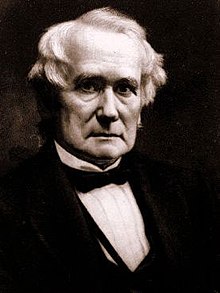Henry Charles Carey | |
|---|---|
 | |
| Born | 15 December 1793 |
| Died | 13 October 1879 (aged 85) Philadelphia, Pennsylvania |
| Political party | Republican |
| Academic career | |
| Field | Political economy |
| School or tradition | American School |
| Influences | |
| Signature | |
Henry Charles Carey (December 15, 1793 – October 13, 1879) was an American publisher, political economist, and politician from Pennsylvania. He was the leading 19th-century economist of the American School and a chief economic adviser to U.S. President Abraham Lincoln and Secretary of the Treasury Salmon P. Chase during the American Civil War.
Carey's central work is The Harmony of Interests: Agricultural, Manufacturing, and Commercial (1851), which criticizes the system of laissez faire capitalism and free trade expounded by Thomas Malthus and David Ricardo in favor of the American System of developmentalism through the use of tariff protection and state intervention to encourage national self-sufficiency and unity. Carey was also a critic of the practice of slavery from an economic perspective. His work on protective tariffs was largely influential on the early Republican Party and United States trade policy through the start of the 20th century, and his views on banking and monetary policy were adopted by the Lincoln administration in its issuance of paper fiat currency as legal tender.